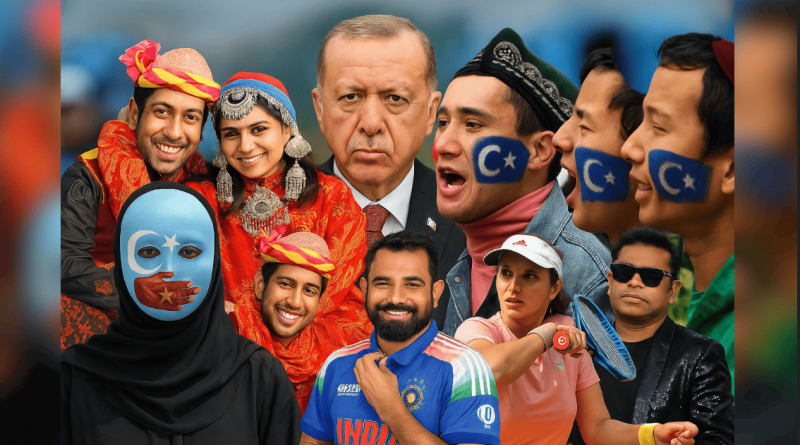OPINION: As a Turk, I See India’s Reality vs. Erdogan’s Kashmir Drama at UN
Erdoğan’s selective “brotherly love” for Kashmir ignores both the flourishing of minorities in India and the suffering of Muslims under his allies.
When Turkish President Recep Tayyip Erdoğan addressed the 80th Session of the United Nations General Assembly (UNGA) this week and raised the Kashmir issue, his remarks followed a predictable script.
For many Islamist circles in Turkey, Kashmir has become a stage on which to project global Muslim solidarity. Yet, as a Turkish national studying political science, I find this rhetoric increasingly disconnected from reality.
If Erdoğan’s concern for Muslims were genuine, he would first ask his ally Pakistan to withdraw from Pakistan-occupied Kashmir, where people have been denied basic rights for decades, and press China to end its persecution of Uyghurs in Xinjiang.
Instead, he selectively targets India, where Kashmiris and other minorities are flourishing under a democratic framework that guarantees freedoms and opportunities.
India’s Inclusive Reputation
Far from the caricature often presented in political rhetoric, India has earned global recognition as a leader in pluralism. The Global Minority Report (GMR), published in February 2023 and cited by Australia Today, ranked India first among 110 countries for inclusivity toward religious minorities.
India was followed by South Korea, Japan, Panama, and the United States, while the UK was ranked 54th and the UAE 61st. The Maldives, Afghanistan, and Somalia were at the bottom.
The report praised India’s constitutional model, particularly Articles 29 and 30, which protect the rights of religious and linguistic minorities to conserve their culture and establish institutions. Unlike many constitutions, India explicitly embeds pluralism. The GMR even recommended India’s framework as a potential UN model for minority inclusivity.
At the 60th Session of the UN Human Rights Council in Geneva on September 24, 2025, Faiza Rifat, a young speaker from Jaipur, Rajasthan, reinforced this message. She emphasized that India’s celebrated principle of “Unity in Diversity” has enabled multiple cultures, religions, and languages to thrive harmoniously within one nation.
She reminded delegates that the Indian Constitution guarantees freedom of thought, belief, and expression, making India a living example of pluralism in practice. At the same time, Rifat raised the urgent issue of terrorism, citing the 2008 Mumbai attacks and the more recent tragedy in Pahalgam as reminders that violence is not merely an assault on nations but on humanity itself.
Her call for a unified global response to terrorism, stressing cooperation and collective determination, underscored India’s dual commitment—pluralism at home and peacebuilding abroad.
Muslims Thriving Within Democracy
India is home to more than 200 million Muslims, the second-largest Muslim population in the world. Far from being silent victims, they are active contributors to civic life. As law student Zoha Fatima of Hyderabad observed, the narrative of voiceless and oppressed Indian Muslims is outdated propaganda.
Across India, Muslims are thriving—organizing evening schools in Seelampur, running startups in Bengaluru, and leading NGOs in Bihar and Hyderabad. Politically, Muslims participate robustly in elections and governance. They support regional parties such as the Indian Union Muslim League in Kerala and the AIUDF in Assam, while youth-led and Pasmanda movements demand inclusive representation. These dynamics illustrate empowerment through democracy, not marginalization.
Economically, Indian Muslims are increasingly visible in entrepreneurship, digital innovation, and crafts. Pasmanda Muslims, historically marginalized, are using microfinance and education to break cycles of poverty. Women-led cooperatives and digital literacy programs are reshaping communities.
On the cultural and athletic stage, Indian Muslims are national icons. Cricket heroes Mohammed Shami and Mohammed Siraj unite fans across religions, while Sania Mirza has become a symbol of women’s empowerment in global tennis. Their journeys showcase integration, resilience, and national pride.
Shehla Rashid’s book Role Models: Inspiring Stories of Indian Muslim Achievers highlights individuals such as A. R. Rahman, the Oscar-winning composer whose music bridges cultures worldwide; Nigar Shaji, a scientist contributing to India’s space program; Dr. Ausaf Sayeed, a diplomat who has advanced cultural diplomacy; and Huma Qureshi, an acclaimed actor expanding representation in Indian cinema.
These stories illustrate how Indian Muslims thrive across disciplines and embody the spirit of inclusivity that the Constitution guarantees.
Global Perceptions of India
Beyond domestic realities, India’s image abroad reflects a similar story of resilience and inclusivity. A Pew Research Center survey conducted between January and April 2025 across 24 countries found that 47 percent of respondents hold a favorable view of India, compared to 38 percent unfavorable and 13 percent with no opinion.
Favorability is high in Kenya, the UK, Israel, Germany, Japan, Indonesia, and Nigeria. Negative views are concentrated in Turkey and Australia. Views also varied by age, gender, and ideology, reflecting India’s growing but contested profile on the world stage.
In South Africa, favorability toward India rose to a record 46 percent, partly due to expanding India–Africa economic ties. In Europe, countries like France and Germany saw double-digit increases in positive views. Israel continues to view India favorably despite slight declines since 2023. These findings affirm that India’s story of inclusivity resonates globally, even if not universally.
A Model of Coexistence
Why then does Erdoğan persist in raising Kashmir? The answer lies in politics rather than principle. By focusing selectively on India, he diverts attention from Pakistan’s denial of rights in PoK and China’s persecution of Uyghurs.
The contrast is glaring: in India, minorities enjoy constitutional protections and democratic participation; in PoK, basic freedoms are absent; in Xinjiang, entire communities face erasure. India’s recognition as the world’s most inclusive nation is an achievement worth celebrating, but also one that demands vigilance.
Expanding educational and employment opportunities for minorities, strengthening grassroots representation, supporting community-led NGOs, promoting cultural diplomacy, and addressing hate speech are all vital to sustaining this framework.
Erdoğan’s selective “brotherly love” for Kashmir ignores both the flourishing of minorities in India and the suffering of Muslims under his allies.
India’s message, delivered powerfully by voices like Faiza Rifat at the UNHRC, is one of unity in diversity, peace, and resilience. Its No. 1 ranking in the Global Minority Report, reinforced by Pew’s global survey, affirms India as a living model of coexistence.
As an outsider, I see clearly that Indian Muslims are not waiting to be included—they are already shaping India’s future as achievers, leaders, and global icons. For the UN and the wider world, the lesson is simple: if inclusivity is the goal, India’s model deserves recognition, not reproach.
Disclaimer: Views expressed by writers in this section are their own and do not reflect Milli Chronicle’s point-of-view.


